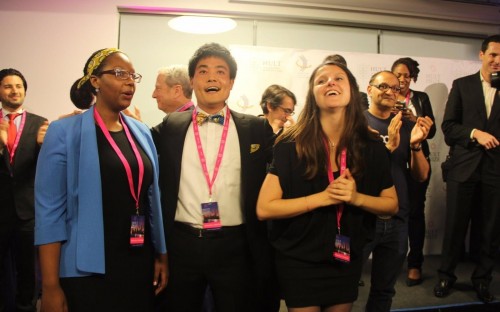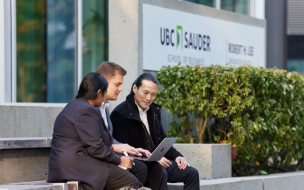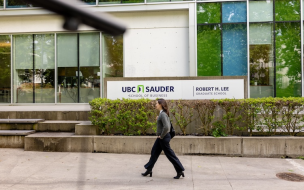In Kampala, Uganda, a proliferation of street vendors are unregistered and do not pay tax, working in an informal, illegal economy. Large urban areas are also notoriously-polluted, with street vendors working around fire hazards and breathing in harmful fumes - particularly charcoal smoke - on a daily basis.
For Nataliey Bitature, this was a problem with a solution. With her co-founders and fellow Master’s of Social Entrepreneurship students at Hult International Business School in San Francisco, Manon Lavaud and Keisuke Kubota, they developed Musana Carts.
A portable street vending cart with clean cooking facilities powered by solar energy, their product means that Ugandan micro-vendors no longer have to rely on cheap, dirty fuels. It's also a way for them to escape the informal economy by registering their income, while employing a host of manufacturers, designers, engineers and technicians to work on the vending carts themselves.
Now at Hult’s Boston Campus, they’re preparing themselves for the final of the Hult Prize, the world’s largest student competition. Providing Musana Carts wins, $1 million in seed capital will enable their business to grow.
With co-founder Nataliey recently being named in the World Economic Forum’s top five female entrepreneurs in Africa, it’s looking like they have a very real chance of winning.
How did you all meet and what gave you the idea to co-found Musana Carts?
We initially met at Hult in San Francisco, where Manon and myself were neighbors.
Manon was the one who originally wanted to look into the Hult Prize, and we teamed up before she had even had an idea. We then linked up with Keisuke, a brilliant systems engineer.
It’s by sharing the same human values and the same ambition of making the world a better place that we had the idea of co-founding Musana Carts.
How did you all come to the decision to pursue Master’s degrees at Hult?
The three of us come from different backgrounds, but we all agree that things can be made better. The crisis in African education impelled me to move into social entrepreneurship, while for Keisuke it was the conflict and violence brought on by ISIS, and for Manon the damaging effects climate change is having on our world.
Once I got my bachelor’s in England and moved to Uganda, I realised how much more I needed to learn about practical business and how important it was to do more than simply make money.
I remembered a lady from Hult explaining their practical approach to learning and their campus rotation options at a business school fair, and being able to move between cities on the same degree convinced me it was the school for me.
How has your Hult Prize journey been so far?
The Hult Prize, along with our degrees, has been the greatest experience we could have hoped for. Giving up was never an option for us, even though our initial ideas weren’t up to scratch.
We were beginning to get desperate, but having seen the work the UN had been doing with solar energy in refugee camps, I came up with the initial product idea for Musana Carts, and after a few minutes we started frantically researching and made a last-minute winning pitch.
From the beginning, we saw the Hult Prize as an opportunity to start a business and make a great impact, never as a student competition. We turned the challenge upside down, finding that the solutions to all our problems lie in the creative work of teams.
Tell me about your trip to Uganda in February.
We initially booked our tickets with credit from an agency, so we didn’t actually have the money to go. However, we then launched a successful crowdfunding campaign.
The week we spent in Uganda was eye-opening, particularly in meeting our customers. We had so much validation for our carts from vendors that it was hard to believe. It’s quite emotional to see that you’re genuinely making a difference.
We came back to San Francisco and we worked harder than ever before. We want to equip the people we serve with the tools to be the heroes of their own stories.
The three of you come from different countries – continents, even. What’s the value of such diversity in starting and running a social enterprise and does Hult encourage it?
Diversity is everywhere today, and eschewing it is unsustainable, especially in the world of business. Our society gains materially from diversity, and enables a better understanding of the world.
We’ve received a lot of support along the way, and having so many different backgrounds, opinions, cultures and specialities all on one campus at Hult has meant there is always someone who can help you, no matter how far or wide the problem is.
What was your favorite aspect of studying at Hult?
The energy at Hult is just incredible. It’s been an enriching journey, augmented by all the dreamers, go-getters and social entrepreneurs we’ve met through classes, along with the passionate and dedicated faculty and staff.
What does the future hold for Musana Carts?
The future for Musana is one of hope, collaboration and commitment. With our one-way tickets to Kampala booked, our team are ready to truly make a difference.
We are determined to succeed and to ensure that all the support we received in the last eight months will help change the lives of street vendors around the world.
RECAPTHA :
43
5e
8a
68







